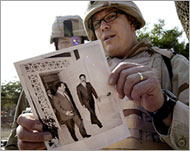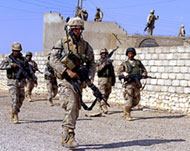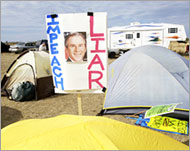Bush outlines Iraq ‘victory’ plan
US President George Bush has defiantly dismissed mounting worries about his Iraq war strategy, refusing to set a date for a US pullout and warning that victory requires time and patience.

Laying out what was billed a “plan for victory” in Iraq, he said decisions about troop levels would be “driven by the conditions on the ground in Iraq and the good judgment of our commanders, not by artificial timetables set by politicians in Washington.
Speaking to a largely military audience at the US Naval Academy in Annapolis, Maryland, on Wednesday, Bush took pains to praise Iraq‘s fledgling security forces and reiterated that they will eventually take over from US troops.
He acknowledged “some setbacks” in training Iraq‘s army and police and acknowledged “their performance is still uneven in some areas” but said there had been steady progress.
“Not every Iraqi unit has to meet this level of capability in order for the Iraqi security forces to take the lead in the fight against the enemy,” the president declared.
“The facts are that Iraqi units are growing more independent and more capable,” he added. “They’re in the fight today and they will be in the fight for freedom tomorrow.”
Democrats targeted
Bush took aim at some opposition Democrats, including some likely 2008 presidential contenders, deriding what he described as their requests for “an artificial timetable” for a US withdrawal.
 |
|
Many Democrat lawmakers want |
“Pulling our troops out before they’ve achieved their purpose is not a plan for victory,” he charged. “This will take time and patience.”
“Victory will come when the terrorists and Saddamists can no longer threaten Iraq‘s democracy, when the Iraqi security forces can provide for the safety of their own citizens, and when Iraq is not a safe haven for terrorists to plot new attacks on our nation,” he said.
The speech was the first in what aides said would be a series, in the run-up to Iraq‘s December elections, laying out progress in Iraq as well as the strategy for the way forward on the political, economic, and security fronts.
Strategy document
In advance of Bush’s remarks, his National Security Council released its most detailed plan yet for success, warning that Iraq will face deadly violence “for many years” but predicting a limited draw-down of US forces in 2006.
“No war has ever been won on a timetable,” according to the new White House strategy document released on Wednesday.
 |
|
Bush cautioned that a US victory |
The 35-page plan titled Our National Strategy for Victory in Iraq says increasing numbers of Iraqi troops have been equipped and trained, a democratic government is being forged, Iraq’s economy is being rebuilt and US military and civilian presence will change as conditions improve.
“We expect, but cannot guarantee that our force posture will change over the next year, as the political process advances and Iraqi security forces grow and gain experience,” the report said.
“While our military presence may become less visible, it will remain lethal and decisive, able to confront the enemy wherever it may organise.”
Bush’s emphasis on the readiness of Iraqi security forces comes at a time when continued violence in Iraq and the death of more than 2000 US troops have contributed to a sharp drop in Bush’s popularity.
Job disapproval
Sixty-two per cent of Americans, in an AP-Ipsos poll taken in November, said they disapproved of Bush’s Iraq policy. Thirty-seven per cent approved of his policy – down from 43% in May. The president’s overall job approval rating is at 37%, the lowest level of his presidency.
Senator Russ Feingold, a Wisconsin Democrat, said on Tuesday that the president should have proposed a plan months ago that includes a flexible timetable, tied to clear benchmarks, for concluding the US military mission in Iraq.
|
“Pulling our troops out before they’ve achieved their purpose is not a plan for victory” US President George Bush |
“The American people deserve a clear plan for concluding our military mission,” said Feingold, who is weighing a bid for the 2008 presidential nomination. “And the Iraqi people need to know without any doubt that we do not intend to stay in that country indefinitely.”
The White House report says victory in Iraq will take time.
“It is not realistic to expect a fully functioning democracy, able to defeat its enemies and peacefully reconcile generational grievances, to be in place less than three years after Saddam (Hussein) was finally removed from power,” the report said.
There are about 160,000 US troops in Iraq. The Pentagon has not committed to any specific drawdown of US forces next year beyond the announced plan to pull back 28,000 troops that were added this fall for extra security during the election.
Political track
In the report, the Bush administration says it is working along a political track to help the Iraqis isolate enemies from those who want to participate in the democratic political process.
The “enemy” is a combination of Iraqis who reject democratic reforms, Saddam loyalists and terrorists and others inspired by al-Qaida.
 |
|
The Iraq war is increasingly |
To maintain security, the report says the US has helped train more than 212,000 Iraqi forces – up from 96,000 in September 2004.
There are now more than 120 army and police battalions in the fight – up from five in August 2004.
Of these battalions, more than 80 are fighting side by side with US-led forces and more than 40 others are taking the lead in the fight.
The document says, however, that multiple challenges remain. Any support that countries, such as Syria or Iran, are giving to anti-US fighters must be neutralised.
Strategies for victory, however, may not be enough to change some minds on Capitol Hill. House Democratic leader Nancy Pelosi on Wednesday embraced a call by a prominent member of her rank-and-file to begin withdrawing US troops from Iraq, two weeks after she declined to endorse it.
Murtha’s lead
“We should follow the lead of Congressman John Murtha, who has put forth a plan to make American safer, to make our military stronger and to make Iraq more stable,” Pelosi said.
“That is what the American people and our troops deserve.”
|
“This war and the safety of the American people is simply too important for flip-flopping or indecision” Dennis Hastert, |
House Speaker Dennis Hastert accused Pelosi of playing politics with the war. “This war and the safety of the American people is simply too important for flip-flopping or indecision. We cannot afford to retreat,” he said in a statement.
Republicans have criticised Murtha’s plan as one of “cutting and running”.
Pelosi said she wouldn’t call for a party caucus position on the plan by the Pennsylvania Democrat because “a vote on the war is an individual vot”.
Nevertheless, she said, “I believe that a majority of our caucus clearly supports Mr Murtha”.